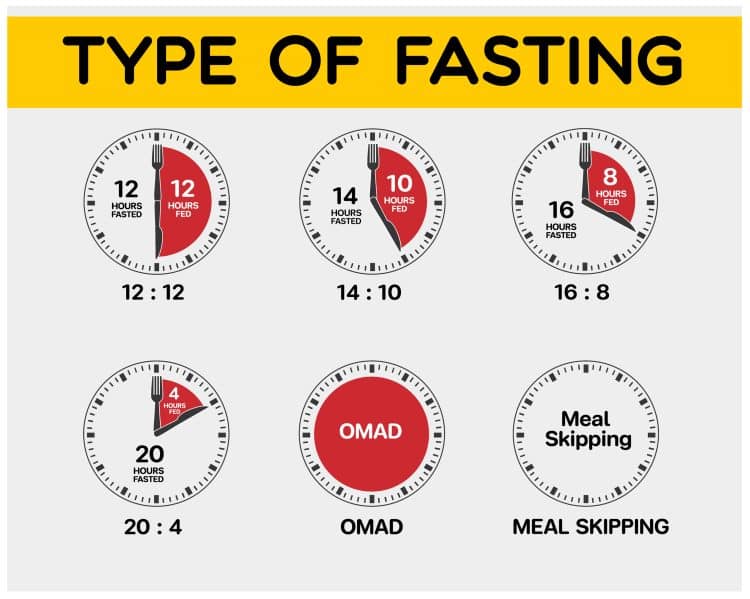During the Old Stone Age, our ancestors had to go without food for an extended period due to lack and limited access to food. But now, people fast for various reasons, including better digestion, weight management, and religious and cultural practices.
Intermittent fasting (IF) has gained traction in the weight loss circles. Besides weight loss, it has been touted for several other health benefits. In recent years, researchers have become more interested in knowing how intermittent fasting affects the body and mind, especially how it benefits the brain.
In this article, we’ll look at the evidence and expert opinions to understand the connection between intermittent fasting and mental well-being. With my years of experience practicing intermittent fasting, I can confidently attest to its health benefits.
What is Intermittent Fasting?
Intermittent fasting involves alternating between periods of eating and fasting. During the fasting period, you are not allowed to eat or drink calories. However, in certain types of approaches, you may be allowed to consume a few calories. Some common types of intermittent fasting include: [1]
- Time Restricted Eating: You can eat during a specific period and fast for the rest of the day. For example, the 16:8 IF plan involves fasting for 16 hours and eating within an eight-hour window.
- Alternate Day Fasting: This entails eating every alternate day and consuming very few or no calories on the fasting days.
- 5:2 Method: This method involves fasting for five days a week and fasting for two non-consecutive days. However, on fasting days, you may consume a maximum of 500 – 600 calories.
How Intermittent Fasting Works?
When you go long hours without consuming calories, your body depletes all its glycogen reserves, starts using stored fat for energy, and burns through fat reserves. This phenomenon is called metabolic switching. Fasting for an extended period leads to fat burning, as your body uses up all the calories from your last meal within a few hours and then utilizes stored fat for energy.
Level Up Your Fitness: Join our 💪 strong community in Fitness Volt Newsletter. Get daily inspiration, expert-backed workouts, nutrition tips, the latest in strength sports, and the support you need to reach your goals. Subscribe for free!
Intermittent Fasting and Mental Health: What the Research Says?
Researchers have recently explored the connection between intermittent fasting and mental health. However, evidence suggests that IF has certain cognitive advantages as we age, and it also helps reduce mental health conditions such as anxiety and depression. [2, 3, 4]
Restricting your food intake may also enhance new brain cell generation, which may be beneficial for accelerating your memory. [5]
There are two ways in which intermittent fasting can benefit your mental health and cognitive function. First, it increases the protein level in the brain, known as brain-derived neurotrophic factor (BDNF). Second, it triggers a process known as autophagy.
How Does BDNF Work?
BDNF is a neuroprotective element that helps resist the damage and buoys up the evolution of new neurons. Studies show that increased BDNF levels tend to reduce the risk of depression, anxiety, and major depressive disorder in people. [6]
BDNF augments mood by interacting with the neurotransmitter serotonin. Both serotonin and BDNF act together to boost brain activity. If there is impaired signaling between these two elements, then it may result in depression and anxiety disorder.
Low levels of BDNF have been associated with several brain disorders, including encephalopathy, Alzheimer’s disease, affective disorders, and posttraumatic stress disorder. [7]
How Autophagy Works?
Autophagy is a phenomenal process in which your body cleanses the internal debris that builds up during the day. In Greek, autophagy means self-eating. It is a self-cleaning process capable of destroying old, worn-out components and putting them into the waste disposal unit within the cell known as the lysosome.
Some of this debris includes damaged proteins, which is the key factor for neurodegenerative disease.
Besides destroying trash, autophagy also helps dispose of misfolded proteins and breaks them down before recycling their parts.
A misfolded protein is a defective form of protein. Some examples of misfolded proteins are Tau protein tangles and Aβ plaques. When these start clumping together, it indicates that autophagy is not functioning properly, and it gives rise to Alzheimer’s disease and other brain-related disorders.
This nightly self-cleaning mechanism promotes generating newer and healthier cells. Research has depicted that any issues with autophagy can be associated with Alzheimer’s disease, bipolar disorder, depression, schizophrenia, and other neuropsychiatric disorders. [8]
Autophagy, a natural body cleansing process, is typically amplified during fasting periods.
When you fast for a prolonged period, your blood glucose reserves are depleted, and your body stops producing insulin. When the insulin levels lower, it triggers autophagy.
Intermittent Fasting Benefits for Your Mental Health
The benefits of IF on mental health include:
1. Improves Memory
Abstaining from food for a long duration has been shown to enhance adult hippocampal neurogenesis, which improves cognition and memory. [9]
According to a study conducted on animals, intermittent fasting improves learning and memory performance. [10]
2. Boosts Mood
As per the Journal of Nutrition Health & Aging, individuals who follow intermittent fasting for three months report decreased stress, irritability, confusion, and improved mood. [11]
Another 2018 study found that intermittent fasting was linked to substantial improvements in emotional health and depression alleviation. [12]
Level Up Your Fitness: Join our 💪 strong community in Fitness Volt Newsletter. Get daily inspiration, expert-backed workouts, nutrition tips, the latest in strength sports, and the support you need to reach your goals. Subscribe for free!
3. Reduces Inflammation
Chronic neuroinflammation could result in several brain maladies, including Alzheimer’s disease, schizophrenia, depression, bipolar disorder, obsessive-compulsive disorder, and more. [13]
As per a 2021 study, intermittent fasting helps reduce inflammation, potentially benefiting brain health and mental well-being. [14]
4. Fights High Blood Sugar
According to a study by Neurology, high blood sugar has been linked to impaired cognition, perhaps due to structural changes in brain regions pertinent to learning. Further, high blood sugar levels negatively impact hippocampal volume and memory performance.15]
Research says that intermittent fasting improves insulin sensitivity, which helps in preventing high blood sugar levels and type 2 diabetes. [16]
5. Lowers Blood Pressure at Night
Intermittent fasting helps decrease blood pressure levels while you sleep, which is advantageous for your heart and ultimately beneficial for your brain, too. High blood pressure reduces the blood circulation to the brain.
Low blood flow to the brain results in various brain-related disorders, including depression, schizophrenia, bipolar disorder, traumatic brain injury, attention deficit hyperactivity disorder (ADHD), suicidal thoughts, substance abuse, and other conditions. Additionally, a decreased blood flow to the brain can lead to Alzheimer’s disease. [17]
6. Burns Excess Fat
Studies suggest that obesity is associated with mood swings, anxiety disorder, and other psychiatric conditions. Obesity is detrimental to mental health and can lead to a higher risk of depression, panic disorder, agoraphobia (fear of going out), bipolar disorder, and addictions. [18,19]
Intermittent fasting helps burn excess fat, which is beneficial for brain health. [20]
Fasting For Mental Health
You can choose an intermittent fasting method that suits your lifestyle and preferences. Some people might prefer fasting for full days, say the 5:2 method, while others may choose time-restricted fasting plans like the 16:8 or 14:10 methods. These plans limit eating to an eight or 10-hour window, respectively.
However, if you are an amateur, you should not jump to more challenging fasting plans immediately. Begin with a 12-hour fasting plan and then progressively extend the duration.
Once comfortable, slowly widen your fasting window. But always have an adequate amount of water and emphasize nutritious foods during your eating window.
What to Eat While Intermittent Fasting?
Eating healthy during your eating window is crucial for improving your mental and physical health.
Incorporate bright-colored foods, leafy green vegetables, whole grains, legumes, lentils, nuts and seeds, fish, and lean meat into your diet. This dietary approach aligns with Mediterranean diet principles, which may also positively impact your mental health. [21]
Eating various plant products will help the good bacteria inside your gut thrive and deliver the nutrients your body needs. Additionally, high fiber and protein help you feel satiated for longer. [22, 23]
In addition to maintaining a proper diet, adopt a holistic and healthy lifestyle to support your mental health. This includes getting enough sleep, managing stress levels, engaging in regular physical activity, and fostering social connections.
Consult a qualified nutritionist or a healthcare professional if you are considering making any alterations to your food and dietary habits.
Frequently Asked Questions (FAQs)
Is intermittent fasting good for the brain?
Research has shown that intermittent fasting not only helps with weight loss, long-term fasting regimens have neuroprotective effects and potential long-term brain health benefits. Intermittent fasting can improve memory function and overall cognition. [24]
Does fasting affect mental performance?
At the onset, it might not be visible, but fasting can help gradually eliminate toxins from your body. This helps your brain clear mental fog, leading to enhanced cognitive clarity, flawless thoughts, and improved memory.
Can fasting increase dopamine?
Yes, fasting may increase dopamine levels. When you restrict food or practice fasting, it alters mesolimbic dopamine activity and affects various behaviors related to rewards. Food restriction tends to lower your baseline dopamine levels while increasing dopamine release. [25]
How long do you need to fast for mental clarity?
If you are struggling with brain fog and are keen to improve your mental clarity, intermittent fasting is the way to go. Restricting calories for 12 to 24 hours is like an exercise for your brain. For best results, fast for at least one to two days a week.
Conclusion
Although research regarding the links between intermittent fasting and mental health is in its initial stages, there is still much evidence that intermittent fasting may help improve brain function as we grow old and reduce the risk of mental health problems like depression, anxiety, bipolar disorder, schizophrenia, and eating disorders.
While intermittent fasting, it is vital to eat healthy in the feeding window. Healthy eating, getting adequate sleep, staying hydrated, reducing stress, and staying active throughout are essential to support your brain health and overall well-being.
Every individual responds uniquely to intermittent fasting. Hence, before starting IF, it is crucial to consult a doctor or a certified nutritionist to ensure safety.
References
- Wang, Y., & Wu, R. (2022, January 5). The Effect of Fasting on Human Metabolism and Psychological Health. Disease Markers; Hindawi Publishing Corporation.
- Ooi, T. C., Meramat, A., Rajab, N. F., Shahar, S., Ismail, I. S., Azam, A. A., & Sharif, R. (2020, August 30).
Intermittent Fasting Enhanced the Cognitive Function in Older Adults with Mild Cognitive Impairment by Inducing Biochemical and Metabolic Changes: A 3-Year Progressive Study. Nutrients; Multidisciplinary Digital Publishing Institute. - Berthelot, E., Etchecopar‐Etchart, D., Thellier, D., Lançon, C., Boyer, L., & Fond, G. (2021, November 5).
Fasting Interventions for Stress, Anxiety, and Depressive Symptoms: A Systematic Review and Meta-Analysis. Nutrients; Multidisciplinary Digital Publishing Institute. - Berthelot, E., Etchecopar‐Etchart, D., Thellier, D., Lançon, C., Boyer, L., & Fond, G. (2021, November 5).
Fasting Interventions for Stress, Anxiety, and Depressive Symptoms: A Systematic Review and Meta-Analysis. Nutrients; Multidisciplinary Digital Publishing Institute. - Kim, C., Pinto, A. M., Bordoli, C., Buckner, L., Kaplan, P. C., Del Arenal, I. M., Jeffcock, E. J., Hall, W. L., & Thuret, S. (2020, February 28).
Energy Restriction Enhances Adult Hippocampal Neurogenesis-Associated Memory after Four Weeks in an Adult Human Population with Central Obesity; a Randomized Controlled Trial. Nutrients; Multidisciplinary Digital Publishing Institute. - Phillips, C. (2017, January 1). Brain-Derived Neurotrophic Factor, Depression, and Physical Activity: Making the Neuroplastic Connection. Neural Plasticity; Hindawi Publishing Corporation.
- Zhang, H., Özbay, F., Lappalainen, J., Kranzler, H. R., Van Dyck, C. H., Charney, D. S., Price, L. H., Southwick, S. M., Yang, B., Rasmussen, A. M., & Gelernter, J. (2006, April 28). Brain-derived neurotrophic factor (BDNF) gene variants and Alzheimer’s disease, affective disorders, posttraumatic stress disorder, schizophrenia, and substance dependence. American Journal of Medical Genetics Part B: Neuropsychiatric Genetics; Wiley-Blackwell.
- G., Barth, S., & Macleod, K. F. (2010, April 1). Autophagy: cellular and molecular mechanisms. The Journal of Pathology; Wiley.
- Dias, G. P., Murphy, T., Stangl, D., Ahmet, S., Morisse, B., Nix, A., Aimone, L. J., Aimone, J. B., Kuro‐o, M., Gage, F. H., & Thuret, S. (2021, May 25). Intermittent fasting enhances long-term memory consolidation, adult hippocampal neurogenesis, and expression of longevity gene Klotho. Molecular Psychiatry; Springer Nature.
- Elias, A., Padinjakara, N., & Lautenschlager, N. T. (2023, April 12). Effects of intermittent fasting on cognitive health and Alzheimer’s disease. Nutrition Reviews; Oxford University Press.
- Hussin, N. M., Shahar, S., Teng, N. I. M. F., Ngah, W. Z. W., & Das, S. K. (2013, May 17). Efficacy of Fasting and Calorie Restriction (FCR) on mood and depression among ageing men. The Journal of Nutrition Health & Aging; Springer Science+Business Media.
- Fitzgerald, K. C., Vizthum, D., Henry-Barron, B. J., Schweitzer, A., Cassard, S. D., Kossoff, E. H., Hartman, A. L., Kapogiannis, D., Sullivan, P. A., Baer, D. J., Mattson, M. P., Appel, L. J., & Mowry, E. M. (2018, July 1).
Effect of intermittent vs. daily calorie restriction on changes in weight and patient-reported outcomes in people with multiple sclerosis. Multiple Sclerosis and Related Disorders; Elsevier BV. - Radtke, F., Chapman, G., Hall, J., & Syed, Y. A. (2017, January 1). Modulating Neuroinflammation to Treat Neuropsychiatric Disorders. BioMed Research International; Hindawi Publishing Corporation.
- Gudden, J., Vásquez, A. A., & Bloemendaal, M. (2021, September 10). The Effects of Intermittent Fasting on Brain and Cognitive Function. Nutrients; Multidisciplinary Digital Publishing Institute.
- Kerti, L., Witte, A. V., Winkler, A., Grittner, U., Rujescu, D., & Flöel, A. (2013, October 23). Higher glucose levels associated with lower memory and reduced hippocampal microstructure. Neurology; Lippincott Williams & Wilkins.
- Harvie, M., Wright, C., Pegington, M., McMullan, D., Mitchell, E. S., Martin, B., Cutler, R. G., Evans, D. G., Whiteside, S., Maudsley, S., Camandola, S., Wang, R., Carlson, O. D., Egan, J. M., Mattson, M. P., & Howell, A. (2013, April 16). The effect of intermittent energy and carbohydrate restrictionv. daily energy restriction on weight loss and metabolic disease risk markers in overweight women. British Journal of Nutrition; Cambridge University Press.
- Goldsmith, H. S. (2022, February 15). Alzheimer’s Disease: A Decreased Cerebral Blood Flow to Critical Intraneuronal Elements Is the Cause. Journal of Alzheimer’s Disease; IOS Press.
- Petry, N. M., Barry, D., Pietrzak, R. H., & Wagner, J. (2008, April 1). Overweight and Obesity Are Associated With Psychiatric Disorders: Results From the National Epidemiologic Survey on Alcohol and Related Conditions. Psychosomatic Medicine; Lippincott Williams & Wilkins.
- Simon, G. E., Von Korff, M., Saunders, K., Miglioretti, D. L., Crane, P. K., Van Belle, G., & Kessler, R. C. (2006, July 1). Association Between Obesity and Psychiatric Disorders in the US Adult Population. Archives of General Psychiatry; American Medical Association.
- Moro, T., Tinsley, G. M., Bianco, A., Marcolin, G., Pacelli, Q. F., Battaglia, G., Palma, A., Gentil, P., Neri, M., & Paoli, A. (2016, October 13). Effects of eight weeks of time-restricted feeding (16/8) on basal metabolism, maximal strength, body composition, inflammation, and cardiovascular risk factors in resistance-trained males. Journal of Translational Medicine; BioMed Central.
- Ventriglio, A., Sancassiani, F., Contu, M. P., Latorre, M., Di Salvatore, M., Fornaro, M., & Bhugra, D. (2020, July 30). Mediterranean Diet and its Benefits on Health and Mental Health: A Literature Review. Clinical Practice & Epidemiology in Mental Health; Bentham Science Publishers.
- Westerterp-Plantenga, M. S., Lemmens, S. G. T., & Westerterp, K. R. (2012, August 1). Dietary protein – its role in satiety, energetics, weight loss and health. British Journal of Nutrition; Cambridge University Press.
- Paddon‐Jones, D., Westman, E., Mattes, R. D., Wolfe, R. R., Astrup, A., & Westerterp-Plantenga, M. S. (2008, May 1). Protein, weight management, and satiety. The American Journal of Clinical Nutrition; Elsevier BV.
- Liu, Z., Liu, M., Jia, G., Li, J., Niu, L., Zhang, H., Qi, Y., Sun, H., Lv, Y., & Ma, J. (2023, March 30). Long-term intermittent fasting improves neurological function by promoting angiogenesis after cerebral ischemia via growth differentiation factor 11 signaling activation. PLOS ONE; Public Library of Science.
- Roseberry, A. G. (2015, August 1). Acute fasting increases somatodendritic dopamine release in the ventral tegmental area. Journal of Neurophysiology; American Physiological Society.














